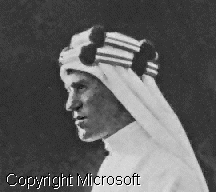
Lawrence was born on August 15, 1888, in Tremadoc, Wales, and educated at the University of Oxford. In 1910 he joined a British Museum archaeological expedition to the ancient Hittite city of Carchemish (now Karkamis, Turkey), and he subsequently traveled in the Sinai, where he learned Arabic. He described his experiences in The Wilderness of Zin (1915).
At the outbreak of World War I in 1914, Lawrence joined the British Military Intelligence Service in Cairo. From there he was sent with a British relief column to the Arab prince Faisal (later King Faisal I of Iraq) in the Hejaz (now in Saudi Arabia). Lawrence then worked among the Arabs in revolt against Turkish rule and, having been accepted as their military adviser, unified their armed forces and led them against the Turks. In 1918 Lawrence and Faisal triumphantly entered Damascus before the arrival of the British army. Lawrence participated in the Paris Peace Conference in 1919, but was unsuccessful in his efforts to gain Arab independence. From 1921 to 1922 he was attached to the Middle East division of the British Colonial Office, but then resigned his post and enlisted in the Royal Air Force under the name of J. H. Ross in an attempt to escape the publicity he had been given. In 1923 he adopted the name T. E. Shaw and joined the tank corps. He rejoined the air force in 1925 and served as an enlisted man until 1935. On May 19 of that year, shortly after his discharge, he was killed in a motorcycle accident in Dorset.
Among Lawrence's books are Seven Pillars of Wisdom (1926), an account of his adventures among the Arabs and considered a literary masterpiece, and a condensed version of the same book, Revolt in the Desert (1927).
"Lawrence, T(homas) E(dward),"
Microsoft (R) Encarta.
Copyright (c) 1994 Microsoft Corporation.
Copyright (c) 1994 Funk & Wagnall's Corporation.
Thomas Edward Lawrence was born on Aug. 15, 1888, in Portmadoc, Wales. After secondary school he enrolled in the University of Oxford in England. He rarely attended classes, but he read continually. Lawrence was interested in the Middle Ages, and after college this interest took him to the Near East to study the castles of the crusaders. He traveled throughout Palestine, Syria, and Mesopotamia.
When World War I began in 1914 Lawrence was rejected for active service because he was too short. He found a place in the War Office and was transferred to the intelligence service in Egypt. Soon he was sent to Arabia with the rank of colonel.
To weld the scattered Arab forces into a fighting unit, Lawrence almost became an Arab himself. He wore an Arab's flowing robes and a chieftain's headdress and rode on camels. Under his leadership attacks against supply trains and other surprise maneuvers routed the Turks from strong positions. In a series of battles his forces destroyed the Fourth Turkish army and captured Damascus.
When the war was over Lawrence looked after Arab interests at the peace conference and took part in the Middle Eastern Settlement of 1921. Then he retired to write 'Seven Pillars of Wisdom' (1926), his account of the revolt. An abridged edition, 'Revolt in the Desert', appeared later. Meanwhile he had enlisted in the armed services as a private. To escape attention he had changed his name, first to J.H. Ross, and then later to T.E. Shaw. He refused any reward or decorations for his military service. Lawrence died in Clouds Hill, Dorsetshire, England on May 19, 1935.
---------------------------------------------------------
Excerpted from Comptonís Interactive Encyclopedia
Copyright © 1994, 1995 Comptonís NewMedia, Inc.